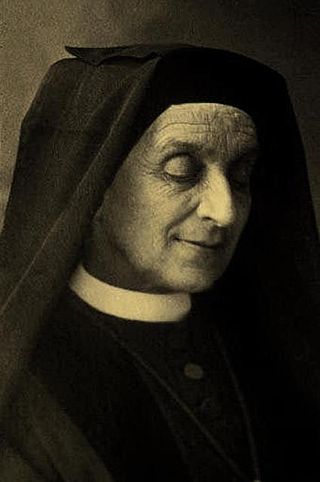
In the Catholic Church, a religious order is a community of consecrated life with members that profess solemn vows. They are classed as a type of religious institute.

The Confederation of Oratories of Saint Philip Neri, abbreviated C.O. and commonly known as the Oratorians, is a Catholic society of apostolic life of pontifical right for men who live together in a community bound together by no formal vows but only with the bond of charity.

Peter Julian Eymard was a French Catholic priest and the founder of two religious institutes: the Congregation of the Blessed Sacrament for men and the Servants of the Blessed Sacrament for women.

The Society of Mary, better known under the name Marist, is a religious congregation under pontifical right.

The Assumptionists, formally known as the Congregation of the Augustinians of the Assumption, is a worldwide congregation of Catholic priests and brothers. It is active in many countries. The French branch played a major role in French political and social history in the 19th century.
A society of apostolic life is a group of men or women within the Catholic Church who have come together for a specific purpose and live fraternally. It is regarded as a form of consecrated life.

The Franciscan Missionaries of Mary are a Roman Catholic centralized religious institute of consecrated life of Pontifical Right for women founded by Mother Mary of the Passion at Ootacamund, then British India, in 1877. The missionaries form an international religious congregation of women representing 77 nationalities spread over 74 countries on five continents.
In the Catholic Church, a canonical visitation is the act of an ecclesiastical superior who in the discharge of his office visits persons or places with a view to maintaining faith and discipline and of correcting abuses. A person delegated to carry out such a visitation is called a visitor. When, in exceptional circumstances, the Holy See delegates an apostolic visitor "to evaluate an ecclesiastical institute such as a seminary, diocese, or religious institute [...] to assist the institute in question to improve the way in which it carries out its function in the life of the Church," this is known as an apostolic visitation.

Mary Frances Schervier, TOSF was a German Catholic nun who founded two congregations of religious sisters of the Third Order Regular of St. Francis, both committed to serving the neediest of the poor. One, the Poor Sisters of St. Francis, is based in her native Germany, and the other, the Franciscan Sisters of the Poor, was later formed from its province in the United States.
The Leadership Conference of Women Religious (LCWR) is one of two associations of the leaders of congregations of Catholic women religious in the United States. LCWR includes over 1300 members, who are members of 302 religious congregations that include 33,431 women religious in the United States as of 2018.
MotherMary Clare Millea was the superior general of the Catholic Apostles of the Sacred Heart of Jesus.
A Religious Brother is a lay member of a religious institute or religious order who commits himself to following Christ in consecrated life of the Church, usually by the vows of poverty, chastity and obedience. Equivalent to a Religious Sister, he usually lives in a religious community and works in a ministry appropriate to his capabilities.
The Religious Congregations of the Syro-Malabar Catholic Church are divided in Code of Canons of the Oriental Churches as Monasteries, Hermitages, Orders, Congregations, Societies of Common Life in the Manner of Religious, Secular Institutes and Societies of Apostolic Life.

Joseph William Tobin, CSsR, is an American prelate of the Catholic Church. A member of the Redemptorist order, he has been the Archbishop of Newark since 2017. He previously served as the Archbishop of Indianapolis from 2012 to 2016 and as secretary of the Congregation for Institutes of Consecrated Life and Societies of Apostolic Life from 2010 to 2012. He has been a cardinal since November 19, 2016.

Hélène Marie Philippine de Chappotin de Neuville, known as Mary of the Passion, was a French religious sister and missionary, who founded the Franciscan Missionaries of Mary in British India in 1877, currently one of the largest religious institutes in the Catholic Church.

Léonie Aviat, her religious name Françoise de Sales, was a Roman Catholic professed religious and the co-founder along with Louis Brisson of the Oblate Sisters of St. Francis de Sales.

The Oblates of Jesus the Priest is a Roman Catholic religious congregation of sisters. Founded in Mexico in 1924, it is now represented in Mexico, the United States, Italy, and Ecuador. Their charism is “to love the priesthood and to make it loved,” so the apostolates of the sisters predominantly center on assisting priests and promoting the priesthood. These include, but are not limited to, ministering in seminaries, aiding retired priests, sewing vestments, assisting in rectories, working as secretaries for bishops, and conducting religious education in some parishes. The Oblate sisters are also very musical, emphasizing singing and playing instruments during their liturgies and sometimes writing their own music.

Elena Guerra, OSS was an Italian Catholic religious sister who founded the Oblates of the Holy Spirit. Guerra was a strong proponent of the Holy Spirit as a motivation to do pious works. She dedicated her life particularly to the education of Chinese and African girls.











